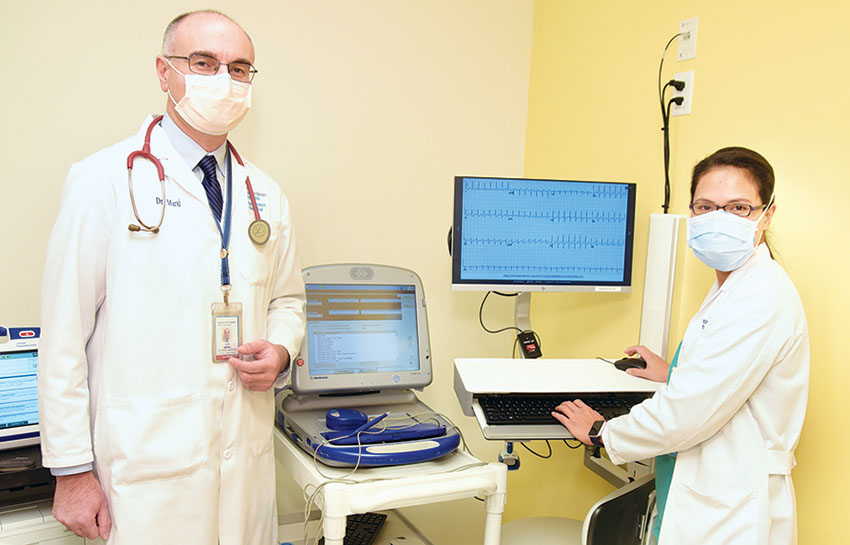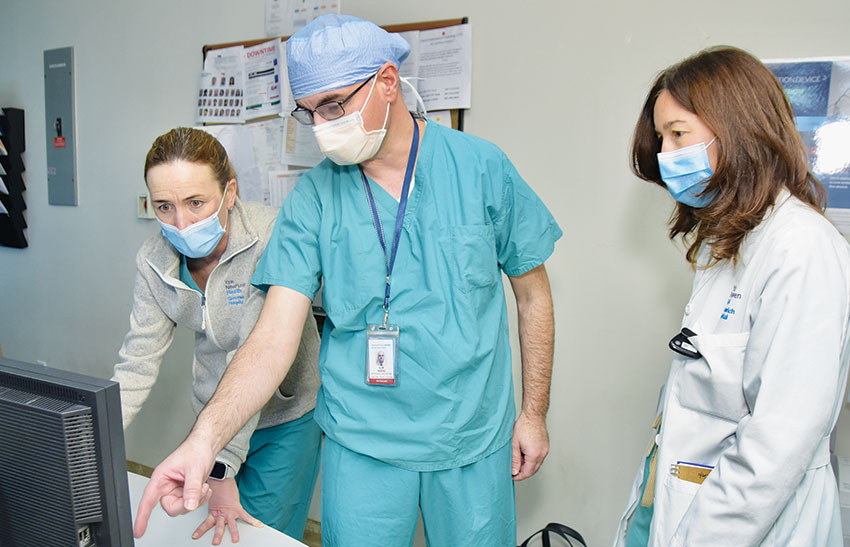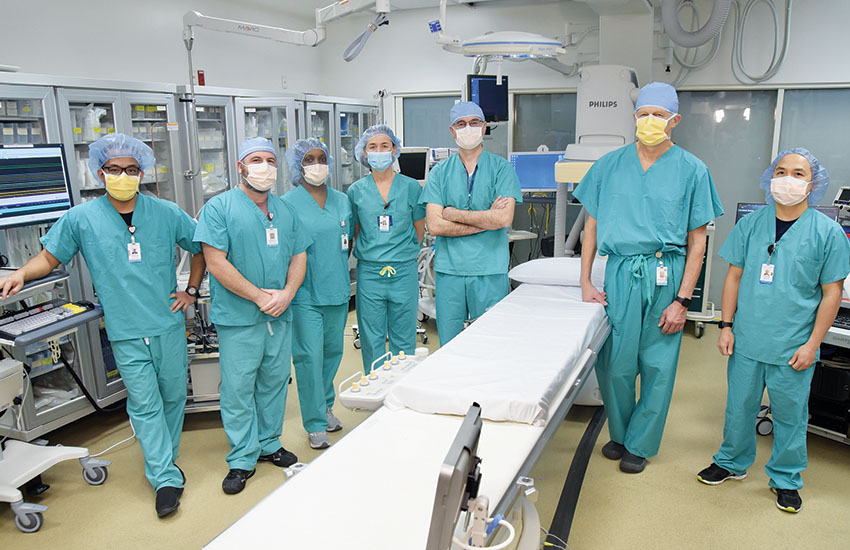-
Services
Featured Services
-
Locations
Location Type
Hospitals and Multispecialty Locations
-
Patients & Visitors
Published March 28, 2022

Jill Ernst’s first cardiac episode occurred nine years ago during the birth of her triplets. Her physician advised the new mother to see a cardiologist. But Ernst attributed the heart issue to the stress of delivering three babies by cesarean section, so she decided to forego visiting the heart specialist.
Her second cardiac event in December 2019, though, was more alarming. Ernst was taking part in a barre class when she suddenly sensed her heart racing.
“I had this overwhelming, light-headed feeling, as if I was going to faint,” she recalled. “It was the first time I had experienced something like that.” She felt well enough to drive to a nearby walk-in clinic in Greenwich. An electrocardiogram (EKG) registered her heart rate in the 180s, far above the normal resting rate, which is usually between 60 and 100 beats per minute. “They assured me, though, that I wasn’t having a heart attack.”
Still, they recommended Ernst, then 43 years old, take an ambulance to Greenwich Hospital’s Emergency Department, where the cardiologist on duty administered another EKG and a chest X-ray, neither of which indicated any heart disorders. “He said such episodes are not uncommon and there was no reason to be admitted to the hospital,” she said. He did prescribe a beta blocker medication used to manage abnormal heart rhythms.

On the advice of her primary care provider, Ernst saw Ilir Maraj, MD, a Yale Medicine electrophysiologist at Greenwich Hospital’s Yale New Haven Health Heart and Vascular Center at 500 West Putnam Avenue in Greenwich. After several tests, Dr. Maraj determined Ernst had supraventricular tachycardia (SVT), a malfunction involving the heart’s electrical system.
SVT is an abnormally fast or erratic heartbeat – often called an arrhythmia – that occurs when the normal electrical impulses in the heart’s two upper chambers are disrupted. “The heart rate goes extremely fast and patients experience symptoms such as shortness of breath, chest pain, fatigue, light-headedness, dizziness and palpitations,” said Dr. Maraj, noting that the condition is more common in women.

While most people are familiar with cardiac conditions involving clogged arteries, many people like Ernst are surprised to learn that the heart also has an intricate electrical system. “The heart is a mechanical pump,” Dr. Maraj said. “However, it has a natural pacemaker that generates electrical signals to the four chambers through specialized fibers, and that’s how the heart beats.” Electrophysiology is a relatively new discipline within interventional cardiology. “I have always been intrigued by heart rhythm issues and the challenges in treating them,” he said.
Medications are the first treatment option for SVT, added Dr. Maraj, who advised Ernst to continue taking the beta blocker and wear a heart monitor to track any recurring arrhythmias. Over the next few months, Ernst experienced another arrhythmia while teaching a yoga class, prompting Dr. Maraj to suggest she undergo an ablation.
“An ablation is an elective procedure during which we insert thin, flexible tubes called catheters through the veins on both sides of the groin,” explained Dr. Maraj. “Using electrical sensors on the tips of the catheters, we trigger the same arrhythmia the patient has experienced. We then apply radiofrequency energy or heat to eliminate the abnormal heart tissue emitting the irregular electrical signals that cause SVT. This procedure restores a normal heartbeat.”
Dr. Maraj scheduled Ernst’s ablation at Yale New Haven Hospital in March 2020, “but then COVID-19 hit,” she said, and the hospital suspended many non-urgent surgeries. Ernst didn’t suffer another SVT arrhythmia until last summer. A friend drove her to Greenwich Hospital’s Emergency Department. “I’ve learned that you should never drive yourself if you are experiencing cardiac issues,” said Ernst.

Ernst finally had the ablation in October 2021. The delay, she said, proved fortuitous because Greenwich Hospital was performing ablations at its Electrophysiology Laboratory by then. That meant the Greenwich resident could access state-of-the-art treatment without a long commute to New Haven. “Jill received general anesthesia, and the ablation took about three hours,” Dr. Maraj said. While the procedure has a 99 percent success rate, he added, there is a slight risk of bleeding, which Ernst did experience.
“I spent the night in the hospital and went home at noon the next day,” said Ernst. “It was very convenient to have the ablation at Greenwich Hospital and my follow-up appointments with Dr. Maraj at the Heart and Vascular Center. Everything I needed was close to home.”
Ernst saw Dr. Maraj six weeks after the procedure and “everything checked out fine,” she said.
“I have my energy back and do not take any medications. I’m also more conscious about pushing myself too hard. Now after yoga, I take a few minutes to cool down and make sure my heart rate hasn’t gone up,” said Ernst. “It feels great to be back to teaching yoga again.”